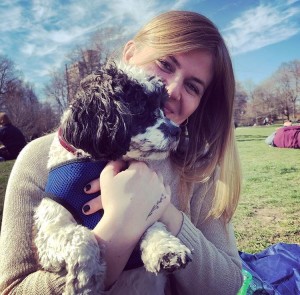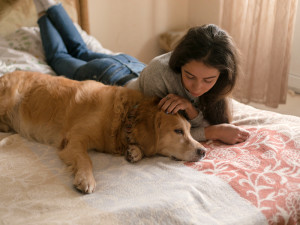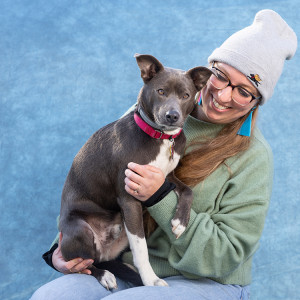Do Dogs Grieve When Other Dogs Die?
A study confirms our pets can have heartbreaking reactions to the loss of a canine companion.

share article

Your pet wants you to read our newsletter. (Then give them a treat.)
I was at a small housewarming party recently where a guest arrived late, looking harried. She explained that one of her dogs, Max, had recently passed away, and her second dog, Penny, was taking it pretty hard. Penny had always struggled with anxiety, but with consistent care and training had made tremendous progress over the past couple of years. Now, without Max around, she was reverting to her old ways.
She was eating lessopens in a new tab, didn’t play as much, wouldn’t engage with the other dogs at daycare, and was having accidents in the house. (Penny’s mom had to clean up one of these accidents before she left, which was why she was late.)
According to a paper published in the journal opens in a new tab in 2022, Penny’s behavior is not unusual. The study looked at data collected from 426 adults with multiple pet dogs and found that surviving dogs who lost a canine companion showed “grief-related and emotional patterns.” The most common behaviors pet parents reported were attention-seeking (67 percent); playing less (57 percent); a decline in activity (46 percent); sleeping more opens in a new tab(35 percent); increased fearfulnessopens in a new tab (35 percent); eating less (32 percent); and increased vocalization, like barkingopens in a new tab and whining (30 percent).
How long do dogs grieve?
Of those participants who noticed a negative behavior change in their surviving dog, about a third said it lasted between two and six months after the death of their companion, 29.4 percent said it lasted less than two months, and 24.9 percent said it lasted over six months.
The study also found that the amount of time the dogs had spent together had no effect on the surviving dog’s likelihood of exhibiting negative behavior. A much stronger predictor, they found, was the quality of the dogs’ relationship. Dogs were far more likely to play less and show disrupted feeding patterns if their relationship with the deceased pup had been described as “friendly,” rather than “agnostic” or “mutual tolerance.”
Dogs and humans influence each other
These findings are significant, because even though most dog parents have spent hours observing and dissecting our dogs’ most minute behaviors, preferences, and quirks, there’s still a lot we don’t know about the inner lives of our furry companions. As Dr. Stefania Uccheddu, one of the authors of the study, tells us, the study was born out of a desire to shed light on a fundamental but still under-explored area of dog’s lives: their complex emotions, particularly grief.
“In general, emotions are perhaps the most enigmatic sphere of animal life — the most difficult to explore,” Dr. Uccheddu explains. It’s this challenge, she says that makes them an especially compelling undertaking for scientists. She adds that one of the findings that surprised her the most was that a surviving dog was more likely to eat less if their pet parent was also displaying signs of grief. This could be the result of “emotional contagion” between the dog and human, or the result of a dog’s ability to pick up on the negative emotions of their pet parents.
“Dogs have become extremely sensitive to human communicative gestures and facial expressions, especially their emotional expressions,” Dr. Uccheddu says. Indeed, the study found a positive correlation between an increased fear level in the surviving dog and the pet parent’s own level of suffering and anger. As two social species, Dr. Uccheddu explained, dogs’ and humans’ emotions are highly susceptible to the emotions of those around them.
Are we just projecting?
How can we know whether the change in behavior we’re seeing is really grief or something else? Are we projecting our own human emotions onto our pets? “I think anyone who has lived with animals for long enough has seen them mourn the passing of a household member, whether it’s an animal or not,” says Robert Haussmann, a certified dog trainer, co-founder of Dogboy NYCopens in a new tab, and The Wildest Collectiveopens in a new tab member. “But is it mourning? Is it separation distress? Is it change in routine distress? Those are all important things to bring up.”
As Haussmann notes, it can be tempting for pet parents to anthropomorphize our pups. And we’re not completely unjustified in doing so. Modern dogs have been bred for centuries to be social and to read human emotions. “That’s why pet dogs are able to be pet dogs,” Haussmann says. “We’ve gone out of our way to make them social creatures, and they’re also highly emotional creatures.”
So, while we can’t say for sure that what a surviving dog is experiencing is definitely grief as we humans conceive of grief, we can’t dismiss the possibility that they’re feeling something similar to our loss either. “In my opinion, I do think dogs mourn their companions,” Haussmann says.
Dogs are pretty stoic, he notes, so they might not display their grief by moping around the house. They might behave like they did before but be more jumpy, bark more, or pull more on the leashopens in a new tab. “Give the dog some time to adjust, and be proactive,” Haussmann says. If they get anxious or aggressive or their new behavior does seem like it requires training, reach out to a professional opens in a new tabwho can help put a plan together for the dog. “If that dog was mirroring their big brother or sister and now they’re gone, you might need you to be a better teacher.”
And above all, Haussmann says, adjusting to the new normal just takes time. “I always point out to people: This is an animal without a language center. They’re not using inner dialogue. They’re not going to journal about it. It’s something that is very different from us, and we need to respect it.”

Madeleine Aggeler
Madeleine Aggeler is a freelance journalist and copywriter in Washington, D.C. Previously, she was a writer at New York magazine’s The Cut. She lives with her dog, Cleo, who works primarily as a foot warmer.
Related articles
![Shiba inu dog sleeping in bed]() opens in a new tab
opens in a new tabMy Dog Sleeps All Day—Is That Normal?
Dogs need more sleep than humans. Here’s how much is healthy.
![Girl Carefully Hugs A Sick Lying Dog]() opens in a new tab
opens in a new tabHow Pet Hospice Can Help When It’s Nearly Time
Veterinary hospice and palliative care expert Dr. Shea Cox, DVM, on an alternative to euthanasia.
![Man hugging his fluffy white dog happily]() opens in a new tab
opens in a new tabChemistry Between People and Dogs Is Real (It’s Science)
How the “love hormone” oxytocin connects us with our pups.
![A woman wearing a gray beanie hat and a light green sweater holding her mixed breed ashy grey dog in front of a blue backdrop]() opens in a new tab
opens in a new tabE.B. Bartels Wrote the Book on Pet Grief
The author’s new book explores different cultural rituals for memorializing a pet — from tattoos to taxidermy.
![]() opens in a new tab
opens in a new tab13 Products Your Senior Dog Needs
From doggy diapers to toe grips, this gear will help your pet thrive through their golden years.
![Sad boxer rests on owners lap, dog doesn't want to be touched]() opens in a new tab
opens in a new tabDon’t Ignore These 9 Behavioral Signs That Your Dog Is in Pain
Animal behaviorist Karen B. London breaks down the silent ways your pet is trying to tell you they’re hurting.







